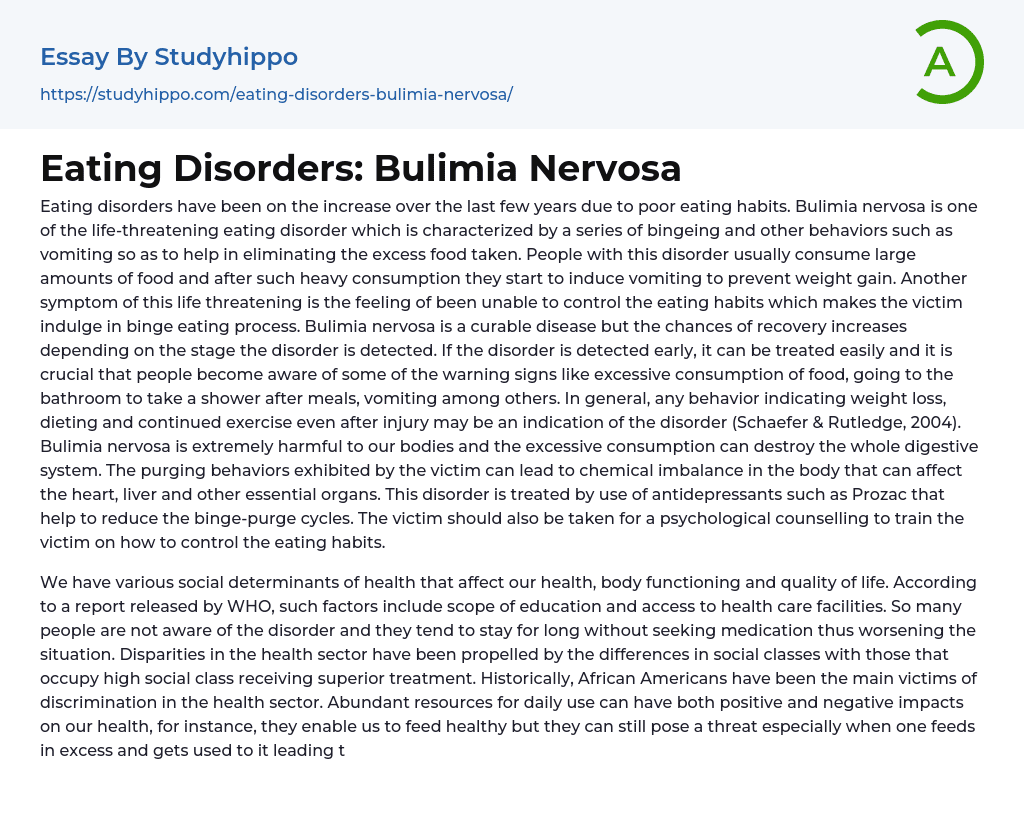The increasing prevalence of bulimia nervosa, an eating disorder characterized by excessive food consumption and purging methods such as vomiting, is attributed to unhealthy eating habits. Individuals with this condition frequently consume large amounts of food and induce vomiting as a means to prevent weight gain.
Bulimia nervosa is a dangerous condition characterized by uncontrollable eating habits, resulting in episodes of binge eating. Early identification and treatment are crucial for recovery. Signs of bulimia nervosa include excessive food intake, post-meal showers, vomiting, weight loss behaviors and dieting, as well as exercising despite injuries (Schaefer & Rutledge, 2004). The excessive consumption associated with this disorder can damage the digestive system and disrupt the body's chemical balance, impacting vital organs such as the heart and liver.
The treatment for this disorder involves the use of antidepressants like Prozac, which aid in reducing the frequency of b
...inge-purge cycles. Additionally, it is crucial for individuals to engage in psychological counseling to acquire techniques for managing their eating habits. Various social determinants of health impact our well-being, bodily functions, and overall quality of life. According to a report from the World Health Organization (WHO), these factors encompass educational opportunities and access to healthcare facilities. Regrettably, many individuals lack awareness of this disorder and postpone seeking treatment, exacerbating the situation. Disparities in the healthcare sector are further magnified by social class distinctions, with individuals in higher social classes receiving superior treatment.
In the past, African Americans have experienced healthcare discrimination, which has affected their overall health. While having ample resources can be beneficial for one's well-being, consuming them excessively can result in bulimia nervosa. This disorder is worsened by societal discrimination as it cause
stress and compels individuals to find ways to cope. College students face a higher risk of developing this condition due to elevated levels of discrimination and readily available abundant resources.
According to Abraham (2008), discrimination can cause low self-esteem and isolation, leading individuals to engage in binge eating. Those with bulimia nervosa also experience added stress due to the negative stigma attached to their condition. It is often mistakenly believed that eating disorders are merely choices that can be overcome by changing harmful behaviors. However, in reality, bulimia nervosa is a complex issue that results in mental, social, and physical challenges and can even lead to fatal outcomes.
People with eating disorders often experience shame and avoid seeking medical assistance, which leads to isolation and a decrease in self-esteem. Studies have discovered that it usually takes approximately ten years for these individuals to seek treatment, resulting in delayed diagnosis and numerous fatalities. It is essential to educate the public about eating disorders in order to dispel misunderstandings and improve attitudes towards bulimia nervosa. Ultimately, this will contribute to enhancing our culture and social life.
References
- Abraham, S. (2008). Eating disorders: The facts. Oxford: Oxford University Press
- Costin, C. (2007). The eating disorder sourcebook: A comprehensive guide to the causes, treatments, and prevention of eating disorders.
- Schaefer, J., & Rutledge, T. (2004).
A book titled "Life without Ed: How one woman declared independence from her eating disorder and how you can too" by New York's McGraw-Hill, explores the journey of a woman overcoming her eating disorder and offers guidance on achieving
the same.




